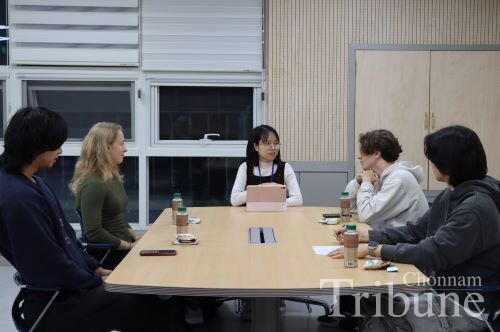
As the world grapples with its ongoing climate crisis, leaders around the world are endeavoring to navigate this storm with more refined energy policies, particularly concerning nuclear power. Atomic technologies are at the heart of many efforts to achieve sustainable development during the climate crisis. However, the debate over whether nuclear power holds the key to this daunting issue remains fierce due to safety concerns. The Chonnam Tribune explored the public’s perspectives about nuclear power through the eyes of a multinational group of students at Chonnam National University.
Q. What is your country’s current perspective on nuclear power?
Carolin Marie Kruckewitt (Germany): Germany has successfully concluded its nuclear power phase-out. Shortly before midnight, April 15, 2023, the last three nuclear power plants in Germany were shut down. Germany has compensated for this by relying more on renewable energy sources and energy imports from neighboring European countries. Until the very end, the nuclear power phase-out was a little controversial, and there were ongoing debates, but the phase-out has become a reality now.
Noh Hyeon-min (South Korea): The South Korean government is presently pursuing a pro-nuclear policy that was introduced around 2022. Global challenges such as the COVID-19 pandemic and the Russia-Ukraine war have led to increased demand and rising prices for energy resources, including gas, thereby highlighting the limitations of the previous government’s anti-nuclear stance. Consequently, the current government sees nuclear power as essential to stabilize energy supply and control electricity prices.
Lemaire Morgan Jean Maurice (France): In 2024, France strongly reaffirmed its commitment to nuclear energy, viewing it as crucial for achieving energy independence and carbon neutrality. The French government aims to construct between six and 14 new reactors, emphasizing the importance of small modular reactors (SMRs) for safety and efficiency. This push reflects a broader strategy to modernize the country's aging nuclear infrastructure and address rising energy demands.
Q. How is the nuclear power industry fostered in your country?
Lemaire Morgan Jean Maurice: The French government has allocated €1.2 billion to foster innovation in the nuclear sector, focusing on the development of SMRs. These smaller reactors promise enhanced safety and adaptability. Companies like “Newcleo” are leading efforts to create advanced reactor designs, which could revolutionize the nuclear landscape while addressing safety concerns.
Noh Hyeon-min: Recently, the South Korean government announced plans to construct four new SMRs in the 11th Basic Plan for Electricity Supply and Demand, aiming to enhance South Korea’s energy self-sufficiency and position the nation as a leader in the small-sized nuclear export market. President Yoon secured a nuclear plant construction project in the Czech Republic valued at roughly 24 trillion KRW (around 18 billion USD), in addition to a role in the joint development of power plants in the UAE.
Q. What are the reasons for opposition to nuclear atomic power in your country?
Terui Takehiro (Japan): There was a huge accident at the Fukushima Nuclear Power Plant in 2011, which caused a lot of damage and many adverse consequences in Japan. Citizens could not return to their homes in the aftermath of the accident, fish and vegetables from nearby areas were not sold, and some people got sick because of radiation. People are afraid of more accidents, so they're against continuing the use of atomic power plants. However, the Japanese government is considering expanding nuclear power capacity by building new next-generation plants and extending the operation lifespans of existing ones, according reports released on June.
Carolin Marie Kruckewitt: The anti-nuclear power movement has existed in Germany for a long time, beginning in the 1970s. People in the country have reacted very strongly to nuclear accidents in the past, such as the Chernobyl nuclear accident in 1986. Advocates of the nuclear phase-out state that radiation hazards, accidents, and problems related to nuclear waste disposal are the main reasons. Finally, after the Fukushima nuclear crisis in 2011, German Chancellor Angela Merkel declared the nuclear phase-out, which the German parliament ratified on June 30, 2011.
According to experts, the operation of commercial nuclear power stations provides immense benefits to the environment and society, such as enormous sources of low-carbon electricity, research reactors that produce medical and industrial isotopes, and support for space exploration. Nevertheless, devastating accidents in the past, the possibility of more such tragedies in the future, and concerns about the human and environmental impact of harmful nuclear waste continue to fuel substantial opposition to the use of nuclear power. It will probably take a long time to determine whether nuclear energy represents a bridge to a carbon-free future or a risk-laden relic of the past. But the current climate crisis necessitates urgent action, and the atom represents one of our worst options. The role of youth in addressing the climate crisis is undeniable. With great awareness, passion, and determination, they are reshaping the planet’s future and laying the cornerstone for a better tomorrow.
----------------------------------------------------------
Lemaire Morgan Jean Maurice, Exchange Student, Faculty of Business Administration, France
Carolin Marie Kruckewitt, Exchange Student, Faculty of Business Administration, Germany
Terui Takehiro, Exchange Student, Faculty of Economics, Japan
Noh Hyeon-min, Senior, Dept. of Political Science and International Relations, South Korea
By Hoang Thi Le Tra, Reporter
